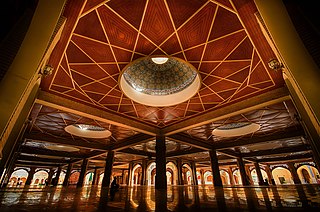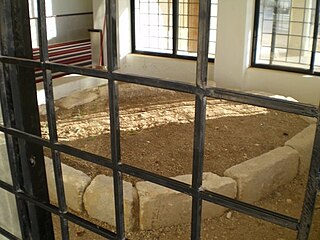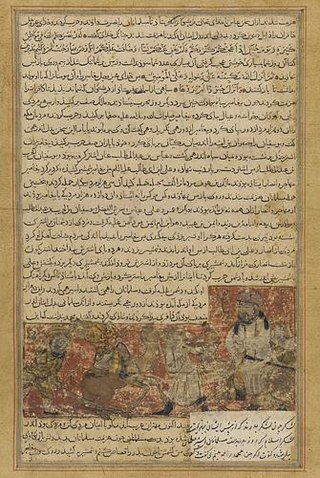
Jihad is an Arabic word that means "exerting", "striving", or "struggling", particularly with a praiseworthy aim. In an Islamic context, it encompasses almost any effort to make personal and social life conform with God's guidance, such as an internal struggle against evil in oneself, efforts to build a good Muslim community (ummah), and struggle to defend Islam. In non-Muslim societies, the term is most often associated with offensive warfare and violence.

Umar ibn al-Khattab, also spelled Omar, was the second Rashidun caliph, ruling from August 634, when he succeeded Abu Bakr as the second caliph, until his assassination in 644. Umar was a senior companion and father-in-law of the Islamic prophet Muhammad.
Jizya, or jizyah, is a type of taxation historically levied on non-Muslim subjects of a state governed by Islamic law. The Quran and hadiths mention jizya without specifying its rate or amount, and the application of jizya varied in the course of Islamic history. However, scholars largely agree that early Muslim rulers adapted some of the existing systems of taxation and modified them according to Islamic religious law.

Kufa, also spelled Kufah, is a city in Iraq, about 170 kilometres (110 mi) south of Baghdad, and 10 kilometres (6.2 mi) northeast of Najaf. It is located on the banks of the Euphrates River. The estimated population in 2003 was 110,000. Currently, Kufa and Najaf are joined into a single urban area that is mostly commonly known to the outside world as 'Najaf'.

In Islam, khums is a tax on Muslims which obligates them to pay one-fifth (20%) of their acquired wealth from the spoils of war and, according to most Muslim jurists, other specified types of income, towards various designated beneficiaries. It is treated differently in Sunni and Shia Islam. Historically, khums was paid to the Islamic prophet Muhammad, his close relatives, orphans, the needy and travelers. After Muhammad's death, disagreement arose about how to use the share once given to Muhammad and whether to continue to give his close relatives a share of the khums. Nowadays, this tax is understood to be paid to the imam, caliph or sultan, representing the state of Islam, for distribution between the orphans, the needy, travelers, and, according to some jurists, the descendants of Muhammad. Khums is separate from other Islamic taxes such as zakat and jizya.

The military career of Muhammad, the Islamic prophet, encompasses several expeditions and battles throughout the Hejaz region in the western Arabian Peninsula which took place in the final ten years of his life, from 622 to 632. His primary campaign was against his own tribe in Mecca, the Quraysh. Muhammad proclaimed prophethood around 610 and later migrated to Medina after being persecuted by the Quraysh in 622. After several battles against the Quraysh, Muhammad conquered Mecca in 629, ending his campaign against the tribe.

Al-Anfal is the eighth chapter (sūrah) of the Quran, with 75 verses (āyāt). Regarding the timing and contextual background of the revelation, it is a "Medinan surah", completed after the Battle of Badr. It forms a pair with the next surah, At-Tawba.

ʿAbd al-Raḥmān ibn ʿAwf was one of the companions of the Islamic Prophet Muhammad. One of the wealthiest among the companions, he is known for being one of the ten to whom Paradise was promised.
Al-Khaṭṭāb ibn Nufayl was an Arab chief from the Meccan branch of Quraysh. He lived during the sixth century and was a contemporary of the Islamic prophet Muhammad. His son Umar would later become Muslim, and would come to be the second Rashidun Caliph. He was the ancestor of a good number of the companions of the Prophet.

Islamic military jurisprudence refers to what has been accepted in Sharia and Fiqh by Ulama as the correct Islamic manner, expected to be obeyed by Muslims, in times of war. Some scholars and Muslim religious figures describe armed struggle based on Islamic principles as the Lesser jihad.

The Battle of Hunayn was a conflict between the Muslims of the Islamic prophet Muhammad and the tribe of Qays in the aftermath of the conquest of Mecca. The battle took place in 8 AH in the Hunayn valley on the route from Mecca to Taif. The battle ultimately ended in a decisive victory for the Muslims, and it is one of the few battles mentioned by name in the Qur'an, where it appears in Surat at-Tawbah.

The Battle of Khaybar was an armed confrontation between the early Muslims and the Jewish community of Khaybar in 628 CE. Khaybar, which is located approximately 150 kilometres (93 mi) to the northwest of Medina, was home to a sizable community of Jewish tribes.
ʾAmīr al-Muʾminīn or Commander of the Faithful is a Muslim title designating the supreme leader of an Islamic community.

In Islamic law, a mukataba is a contract of manumission between a master and a slave according to which the slave is required to pay a certain sum of money during a specific time period in exchange for freedom. In the legal literature, slaves who enter this contract are known as mukatab. The Ẓāhirī school of Islamic jurisprudence view it to be compulsory, while the Shafa'is, Malikis and Hanafis perceive it to be merely recommended, and mustahabb (praiseworthy) to do so. Mukataba is one of the four procedures provided in Islam for manumission of slaves.

Umar was the second Rashidun Caliph and reigned during 634–644. Umar's caliphate is notable for its vast conquests. Aided by brilliant field commanders, he was able to incorporate present-day Iraq, Iran, Azerbaijan, Armenia, Georgia, Syria, Jordan, Palestine, Lebanon, Egypt, and parts of Afghanistan, Turkmenistan and south western Pakistan into the Caliphate. During his reign, the Byzantines lost more than three fourths of their territory and in Persia, Umar became the king (ruler) of Iran after the fall of the Sassanid Empire.

Sa'd ibn Abi Waqqas ibn Wuhayb al-Zuhri was an Arab Muslim commander. He was the founder of Kufa and served as its governor under Umar ibn al-Khattab. He played a leading role in the Muslim conquest of Persia and was a close companion of the Islamic prophet Muhammad.
The Expedition of al-Muraysiʿ was an early Muslim campaign against the tribe of Banu Mustaliq which took place in December 627 CE.
Abu Salih as-Samman was an early Islamic scholar of Medinah. He was a narrator of Hadith is among the Tabi'un generation of Muslims.
Khabbāb ibn al-Aratt, c. 585 – c. 660, was a Companion of the Islamic prophet Muhammad whom Islamic tradition regards as one of the ten earliest converts to Islam. Born as a slave in Mecca, he later became a swordsmith and was able to build up enough of a reputation to eventually get freed by his master. His beautiful recitation of the Quran is said to have been the direct cause of Umar ibn al-Khattab's conversion to Islam in c. 616.
Ḥantamah bint Hishām was the mother of Umar ibn al-Khattab and wife of Khattab ibn Nufayl. She lived during the 6th century and was a contemporary of the Islamic prophet Muhammad. Her son Umar would become Muslim and is regarded as the second "Rightly guided Caliph" by Muslims. She was the ancestor of many Sahabas.











